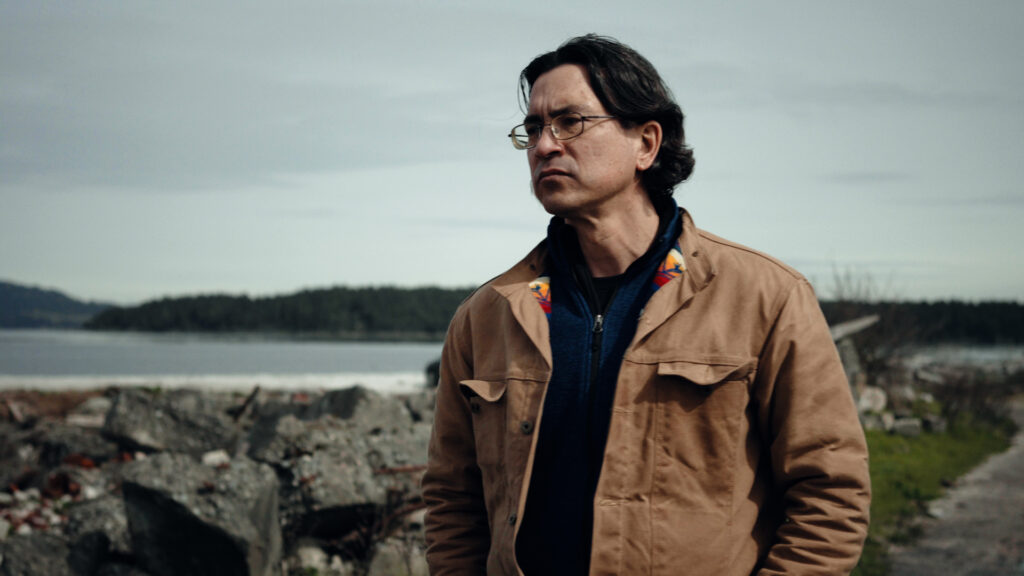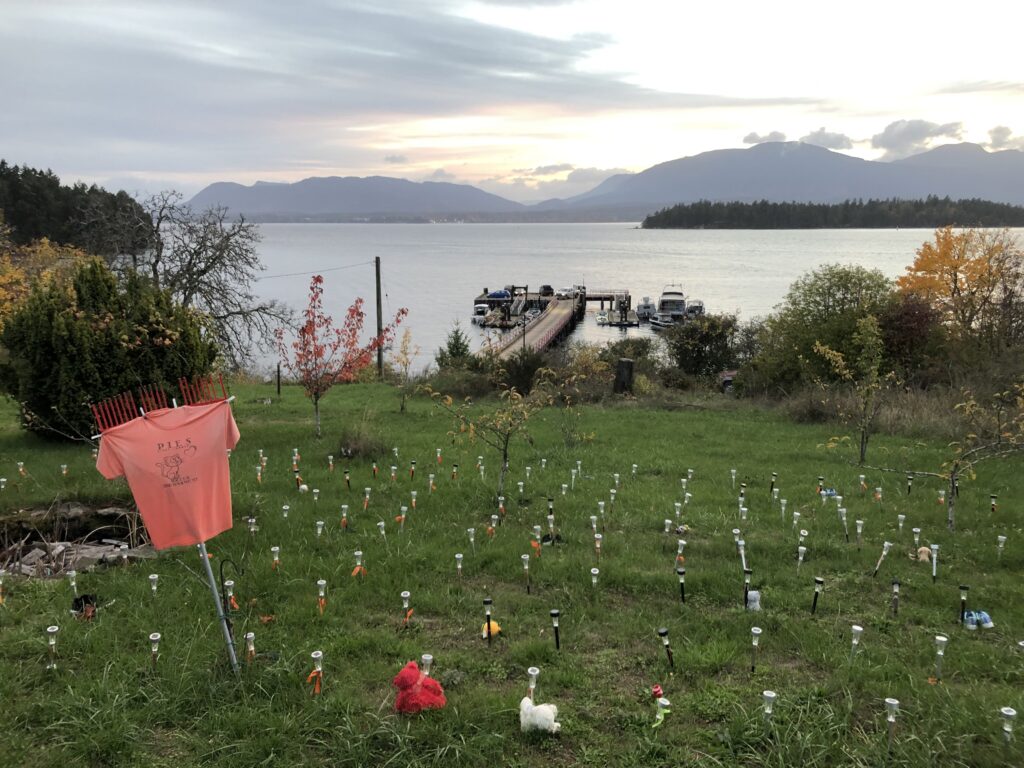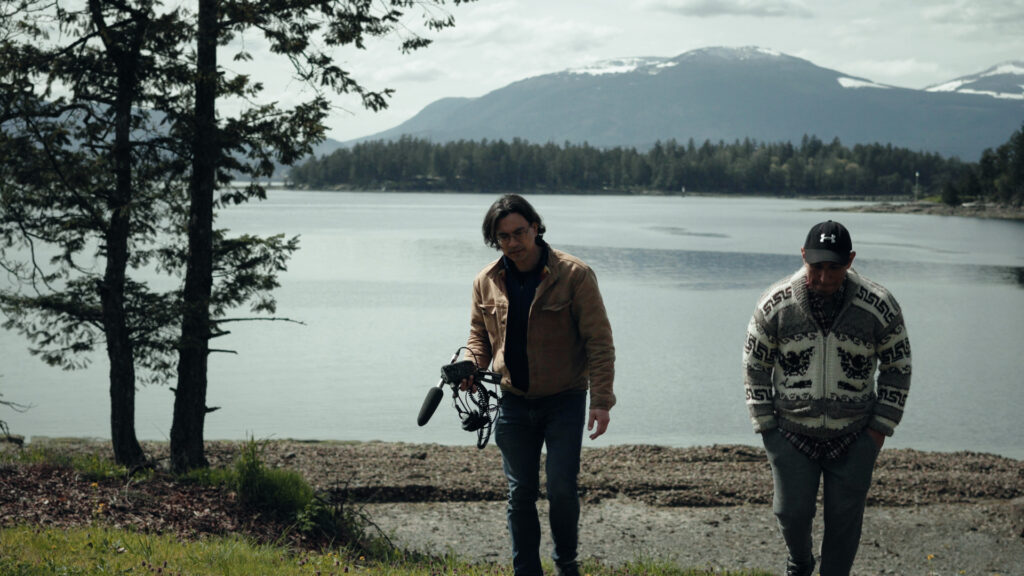
The Kuper Island podcast hosted by award-winning journalist and CBC radio host Duncan McCue, tells the story of three Survivors who attended one of Canada’s most notorious residential schools, Kuper Island, and one boy who died there. The podcast covers the abuse, violence and trauma endured at this institution, which still haunts the community to this day.
In this Q&A, McCue talks about his experiences and the challenges he faced while working on the Kuper Island podcast.
The Interview
How was the time that you got to spend getting to know the members in the community?
“We couldn’t stay in Penelakut itself because there are no hotels or Airbnb. So we stayed in Chemainus which is the closest town. It’s where the ferry leaves from. That area of B.C., the Gulf Islands, is incredibly wealthy. It’s highly sought after real estate in B.C. and there is a kind of wellness vibe in the Gulf Islands. And then in Penelakut, which is a reserve, well they have the scraps, which I guess is typical for reserves–but amidst all that wealth, it was really stark going to that place.
The history of that school has really impacted that community. I’ve been in lots of communities that have the history of residential schools present but, Penelakut, the pain in that community is visceral. I was really struck when I went to Penelakut about just how cautious they were towards outsiders, how cautious they were when talking about the history of that school. The pain is on the surface.”

You mentioned being numb to hearing about these emotional and difficult stories and, as a young journalist who has been doing work within the community, this is something I have said as well when people ask me about my experiences. But, is there anything you do to get in touch with your emotions so you can make sure you are processing them?
“When I was covering the TRC, I did a behind the scenes documentary on one of the TRC events in Vancouver. One of the characters I followed was TRC commissioner Marie Wilson and this was my big question for Marie because she had been criss-crossing the country for the past five years, hearing these stories. They would sit at national events and hear them for eight hours a day so I was like, ‘How do you deal with being in this space for that long?’
She had a team of a spiritual advisor and a mental health advisor that she would make time for at the end of every day during these events. She would sit down and unpack what she had experienced that day because her job was to bear witness and then deliver that in a huge report. Survivors would look to the commissioners and say, ‘This is my truth.’ The commissioners had to be present and feeling compassion for every one of those Survivors who gave testimony.
Marie decompressed with her spiritual advisor and her mental health advisor and I think she was very intentional about compassion fatigue. Making sure she took care of herself to make sure she could be empathetic.
I was trying to compress these trips [to Penelakut], and so day after day I was hearing these really intense and dramatic stories. On one particular day, I tried to articulate this to Jill Harris (an Elder from Penelakut who was interviewed and a part of the podcast), because she was sharing all this important information and I wasn’t feeling anything.
“Compassion fatigue is real”
Duncan Mccue
That is why I tried to articulate this to her because I was sharing how I was processing these things. Compassion fatigue is real. You need to be present because your interview guests will feel if you are not into it, if you’re just asking questions because someone is paying you to ask questions. That’s why I shared how I was feeling because I was worried I wasn’t present, but my brain was trying to protect itself.
As journalists we are not machines and we are not objective and emotionless, in fact we should be part of the story. However, it’s important to remember that as journalists we are always looking for the truth. It’s one thing to keep that emotion and connect with someone as they tell you the story but what we do is evidence based. Back up your journalism with your facts.”
When you were on the phone with Ken Thorson and brother Glenn Doughty you remained very level-headed. I had a new level of respect for how hard that could have been, because I don’t think I would be able to put my emotions aside, as the Catholic church has caused our community a lot of pain. I just wanted to know what you were feeling throughout that phone call. And if it was hard for you to hold back any emotions or bias in that conversation.
“Interviewing Glenn Doughty–who is a predator and pedophile, and as we learn in the phone call an unrepentant one, who made my phone call with him about himself–the true character came out in that brief phone call. My approach in that phone call was to convince him to do a longer sit-down interview. I’ve done this throughout my career, where you know you are going to sit down with people that upset you and controversial people.
I believe that it is important for our audience to hear from these people and to try and understand their perspective. I may or may not agree with them but I wanted to try to help people understand how this happened and how it continued to happen. Glenn Doughty was good with kids; he did magic tricks, entertained them. I wanted people to understand that he grew up in an abusive home, which does not excuse his behavior, but at least it gives you a portrait of who this guy was. He was a gay man who was confused about himself. All of these things made Glenn Doughty. I was hoping that sitting down with him, I maybe could have got through to him and made him recognize the pain that he caused. So this was all that was going through my mind in this phone call.
Ken Thorson, that interview was in person and again I treated this interview a little bit differently because this was the head of the Oblates of Mary Immaculate. So this is an accountability interview. I go into accountability interviews wanting to get a public figure to acknowledge the actions of the organization that they represent. So if I come in all flustery and angry, then people are going to react to me that way. My philosophy is that it’s about the person, trying to draw the person out.”
As I listened to the Kuper Island podcast, it felt so touching, emotional and powerful to hear the Survivors’ stories from their perspectives and voices. It got me thinking that podcasts could be an innovative form of storytelling in Indigenous communities and I think we are seeing this with other podcasts like Unreserved with Rosanna Deerchild. I was wondering what your thoughts were on this and if you see a future of storytelling through podcasts in Indigenous communities.
“I think the connection that is felt between the listener and the Survivors as they are telling the story is not surprising. The reason I got into broadcasting was because at the time when I was entering into television broadcasting, it was the way to reach the largest audience and that’s what I wanted. I quickly realized that broadcasting was incredibly powerful because you can read a print article and you learn a lot, but with broadcast, to hear the voice and hear that emotion, that’s how people really connect with the words.
Podcasting is something that is new to me, because it has taken off within the last four to five years, particularly in the pandemic. And it’s a lot of young people that have taken to this. Podcasting has evolved to be the anti-radio in a way, because it’s very intimate, raw and unpolished.
Here is the thing, it is not expensive to make a podcast. I mean it is and it isn’t. Our team has a lot of resources but anybody can make a podcast. As long as you have a decent computer, you can tell your story. Something Ryan McMahon has been talking about for a while is that podcasting is built for our communities. I think there is so much room for our people to tell the kind of stories that we want to tell.”

As I have started my journalism work within Indigenous communities, I find when I tell people outside the community about my work involving the history of residential schools, that many people make excuses for this part of Canada’s history. I just want to know why you think people are still making excuses. And how can we hold the people who are responsible accountable?
“I think you will hear this over and over again. There will be pushback for a long time of ‘Why don’t they just get over it?’ However, the story was through one lens for a really long time. Our people didn’t have the opportunity to share in the history books. In the early days of the [residential] schools, our people showed interest because they saw benefit and opportunity in a white man’s education. The reality is that our people never signed up for the assimilative goal of the schools and this is when our stories ceased to be told.
So when people say we can’t look back with a modern day lens, it means that they are looking through a white superiority lens and that is the basis of the residential schools. There will continue to be pushback because those who benefit from white superiority don’t like to see the change of power. That said, there are an awful lot of Canadians who are trying to recognize this part of our history and push for accountability.”
